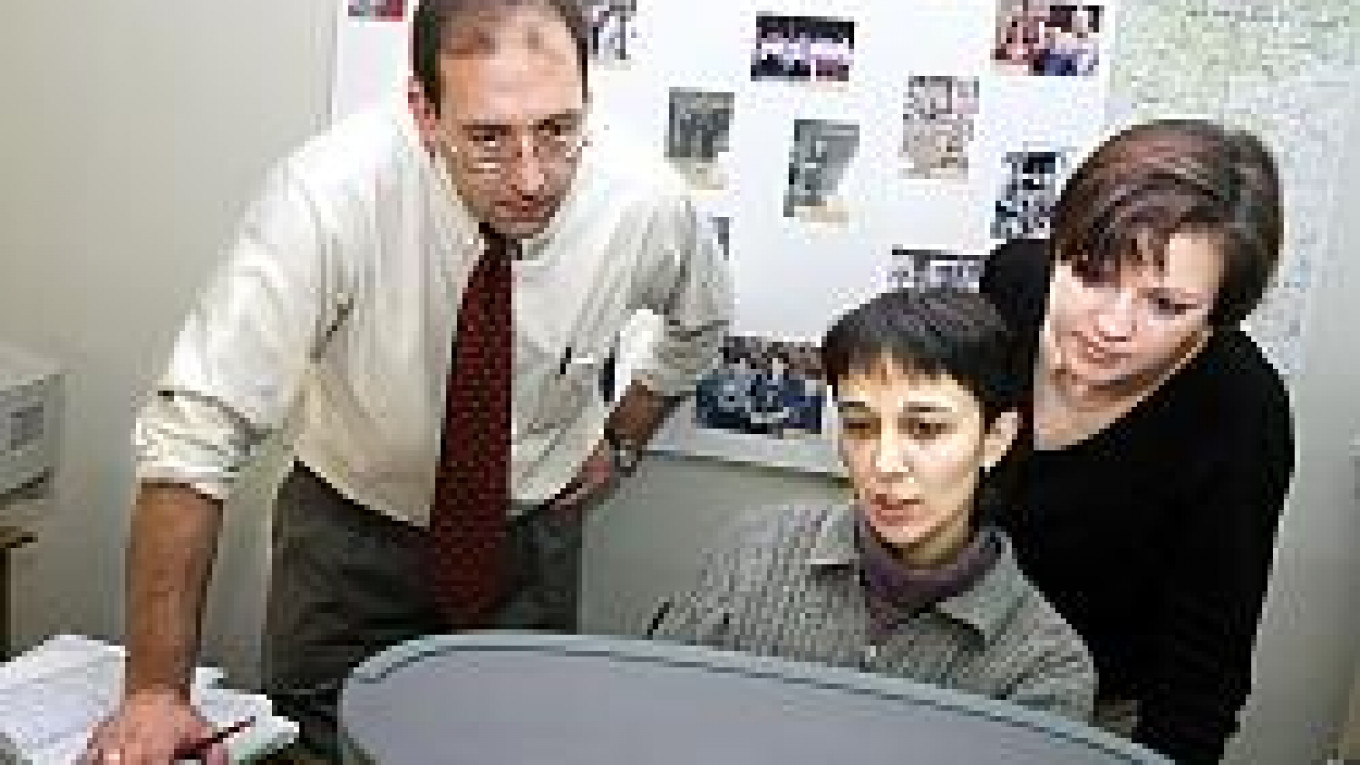So when one of her schoolteachers told her that someone had come to see her on her birthday, the news came as a complete surprise.
A woman named Larisa Maslakova was waiting for her. Maslakova was responding to an invitation by the Secure Futures program run by Kidsave International, a U.S.-based nonprofit organization that offers opportunities to become mentors, or foster or adoptive parents to orphaned children.
Maslakova took Yegorova for a walk on what would be the first of several meetings between the two. Yegorova spent Christmas with Maslakova's family, then other holidays and weekends. Eventually, Yegorova traveled to Minsk to meet Maslakova's parents.
This is an all-too-rare happy ending within the confines of child institutionalization in Russia. In January, Kidsave International released a major study that revealed Russian attitudes toward orphanages and adoption.
The study found that eight out of 10 Russians have never considered raising someone who is not their biological child, and that the vast majority of the population would not consider adoption at this time. Seventy-four percent of respondents cited low income as the reason for not adopting.
Out of 170,000 children ready for adoption, just 15,000 are adopted each year, said Galina Trostanetskaya, who heads the department for social and pedagogical support and rehabilitation of children. "This is too little -- 10 times more adoptions are needed," she said, adding that roughly half of these children are adopted by foreigners.
According to statistics cited by Trostanetskaya, there are currently about 700,000 orphans under the age of 16 living in Russia.
These issues struck a chord with the Moscow business community last December at Kidsave's first annual orphan fundraiser, which took place at the Aerostar Hotel. In addition to raising money for its programs in Smolensk, St. Petersburg, Yuzhno-Sakhalinsk and soon, Moscow, Kidsave aims to change public opinion regarding adoption.
But it is not a campaign that Kidsave can push through on its own, said Eric Batsie, the director of Kidsave in Moscow. "Our goal is to bring everyone together: the government, businessmen, NGO leaders."
They have an uphill battle. Children are ill-prepared for real-life challenges outside the orphanage walls when, at the age of 16, they graduate from high school, and receive very little, if any, support from institutions. Unaware of their rights, orphans are left to fend for themselves for the first time. According to Kidsave, one in three orphanage "graduates" is homeless, one in five commits a crime and one in ten commits suicide.
"I am completely positive that each child who hasn't been taken completely, as I put it, out of state circulation, hasn't simply been found by his or her adoptive parents," said television personality Svetlana Sorokina at the Aerostar fundraiser. Sorokina recently adopted a little girl. "And if something can be done to bring both parties as close as possible, I think that it is possible to solve this problem."
"What struck me about Kidsave is their focus to adopt or foster Russian children," said Bob Foresman, managing director of Dresdner Kleinwort Wasserstein in Russia, who also attended the Kidsave event. Foresman, who recently adopted a 9-year-old Russian girl, talked about the taboo of adoption that still clings to many Russians. In Soviet times, it was literally against the accepted ideology to admit that the state could not care for its own children. "There is suspicion among a lot of Russians that there might be something wrong with these children," Foresman said. "I think that Russian society is ready if there is more public education about adoption and about the need for adoption."
Changes are coming, however slowly, and Yegorova is one orphan who has benefited from them. She has recently been discovering the joys of domestic life. "At Larisa's house, I get a sense of a family, of a home," Yegorova said. "Since I started coming to their house, I realized that I have acquired good friends. When I see how children are talking with their parents, I feel better."
Yegorova likes dancing, singing, crocheting and reading Pushkin. She helps Maslakova around the house and says she is like an older sister to Larisa's three younger children.
"I would like my future family to be like that," Yegorova said.
Since Kidsave began operating in Russia four years ago, it has found permanent families for 847 children and mentors for more than 250 orphanage children. To find out more, contact Eric Batsie at 257-1171/257-5885 or [email protected] or visit www.kidsave.ru.
A Message from The Moscow Times:
Dear readers,
We are facing unprecedented challenges. Russia's Prosecutor General's Office has designated The Moscow Times as an "undesirable" organization, criminalizing our work and putting our staff at risk of prosecution. This follows our earlier unjust labeling as a "foreign agent."
These actions are direct attempts to silence independent journalism in Russia. The authorities claim our work "discredits the decisions of the Russian leadership." We see things differently: we strive to provide accurate, unbiased reporting on Russia.
We, the journalists of The Moscow Times, refuse to be silenced. But to continue our work, we need your help.
Your support, no matter how small, makes a world of difference. If you can, please support us monthly starting from just $2. It's quick to set up, and every contribution makes a significant impact.
By supporting The Moscow Times, you're defending open, independent journalism in the face of repression. Thank you for standing with us.
Remind me later.


